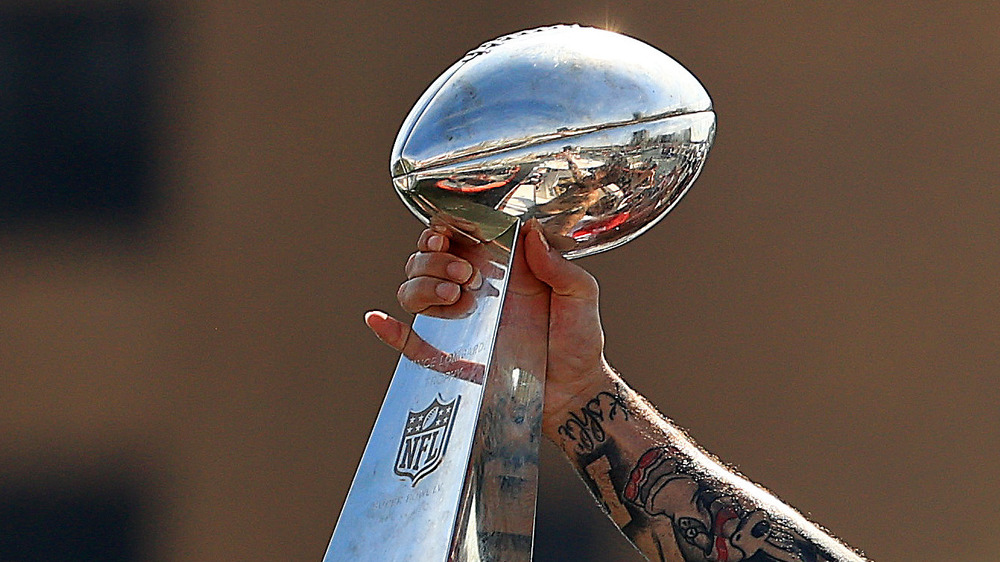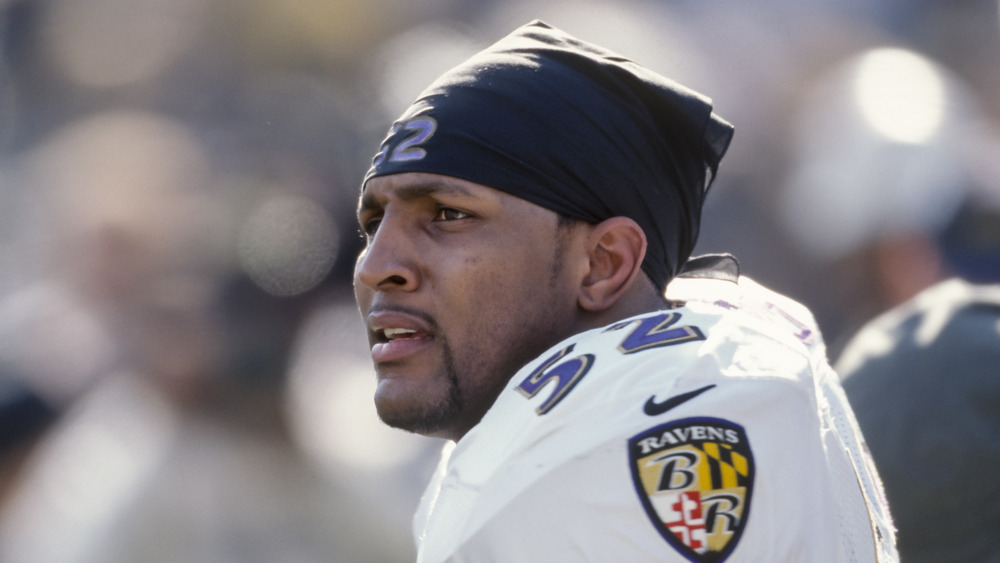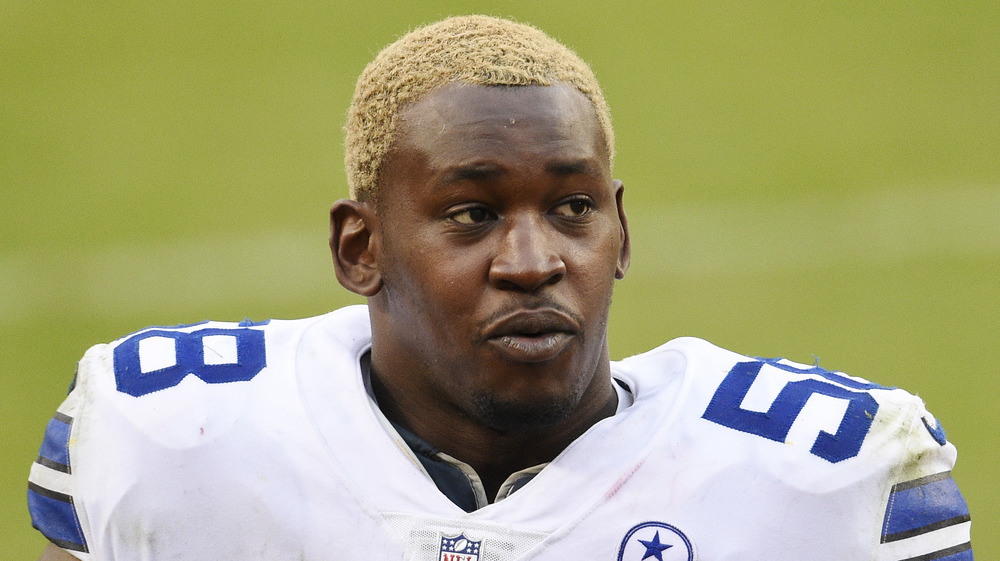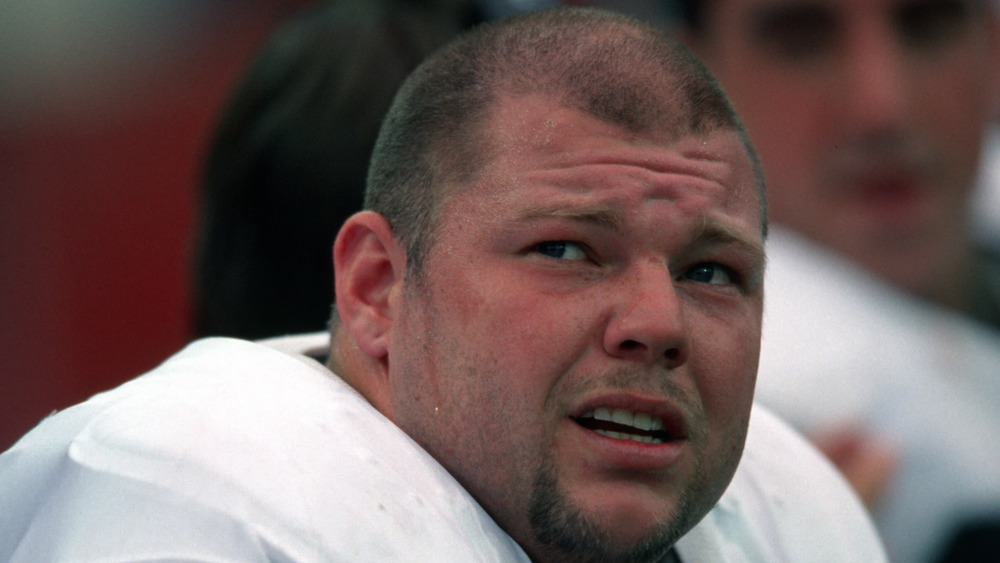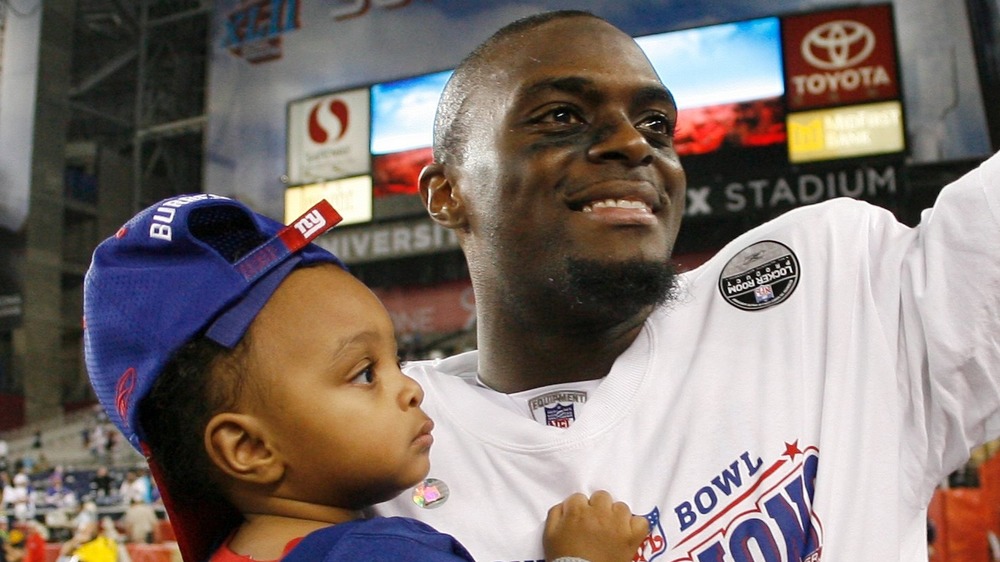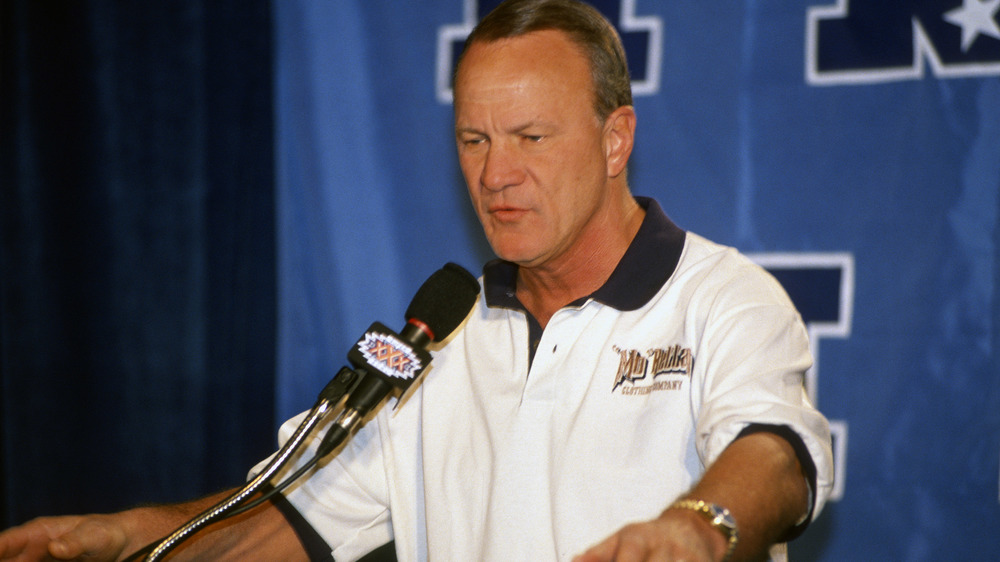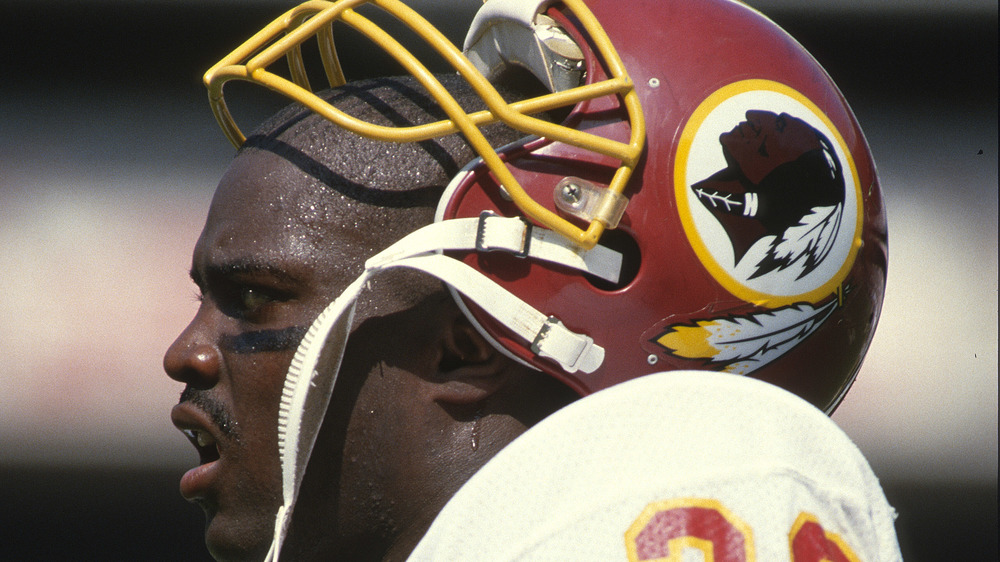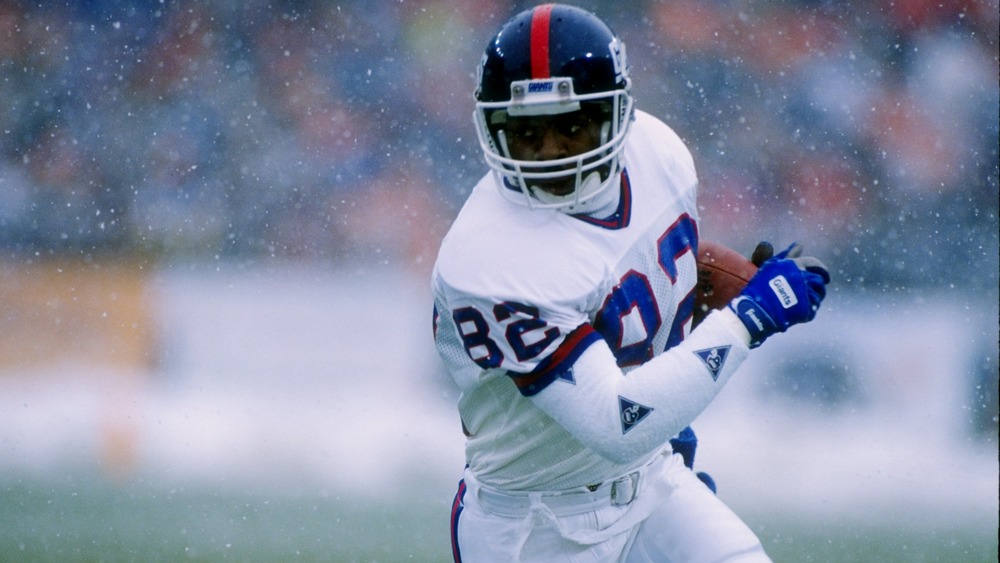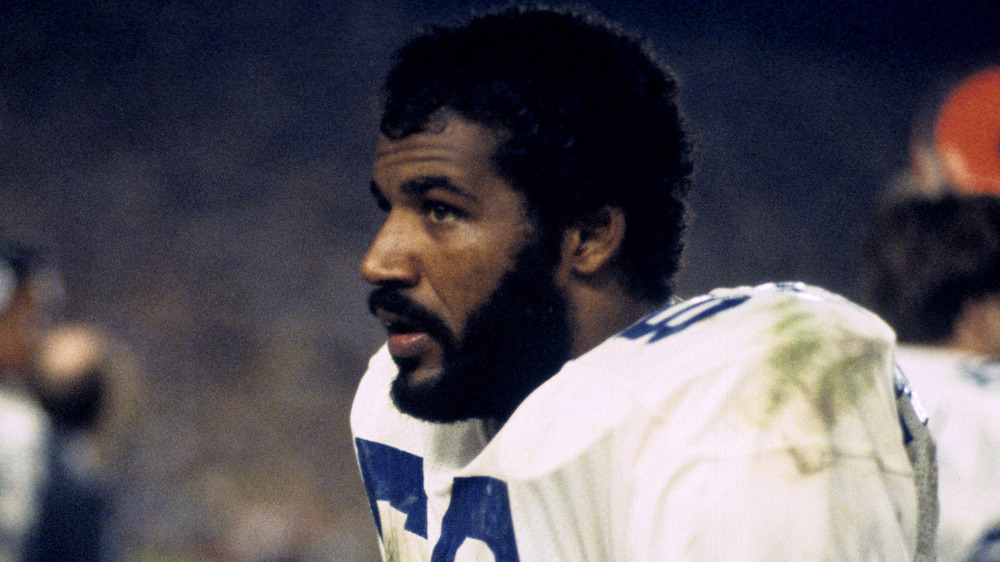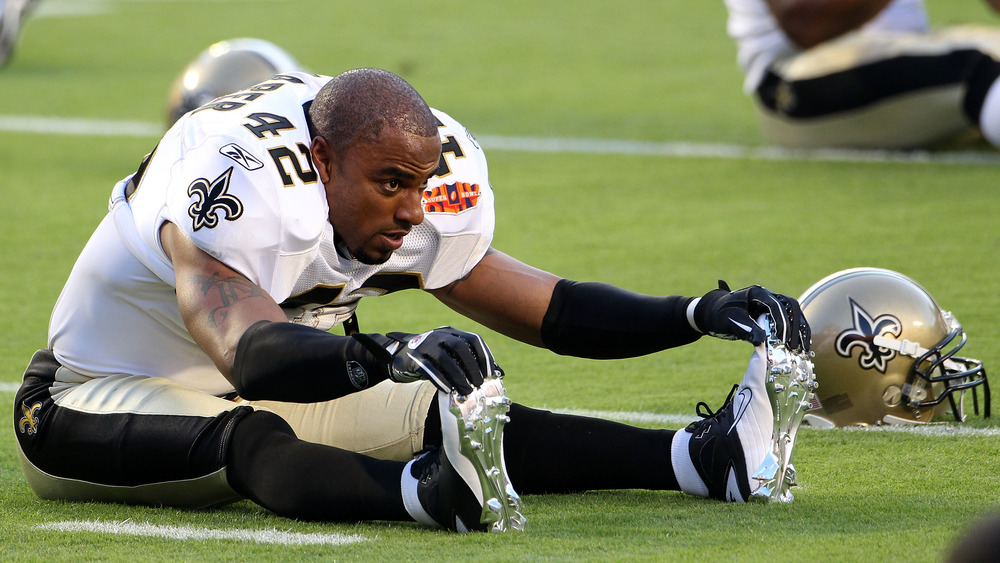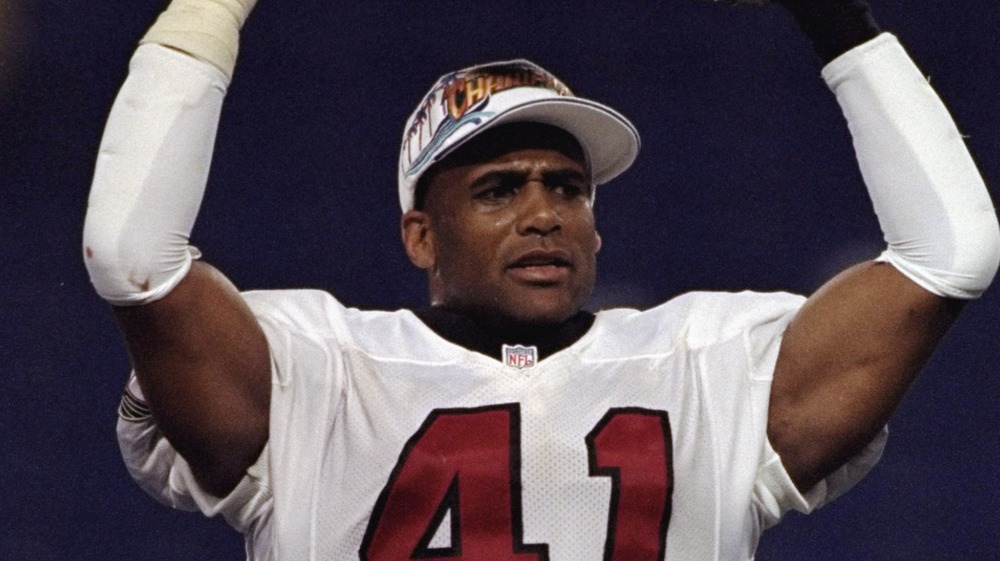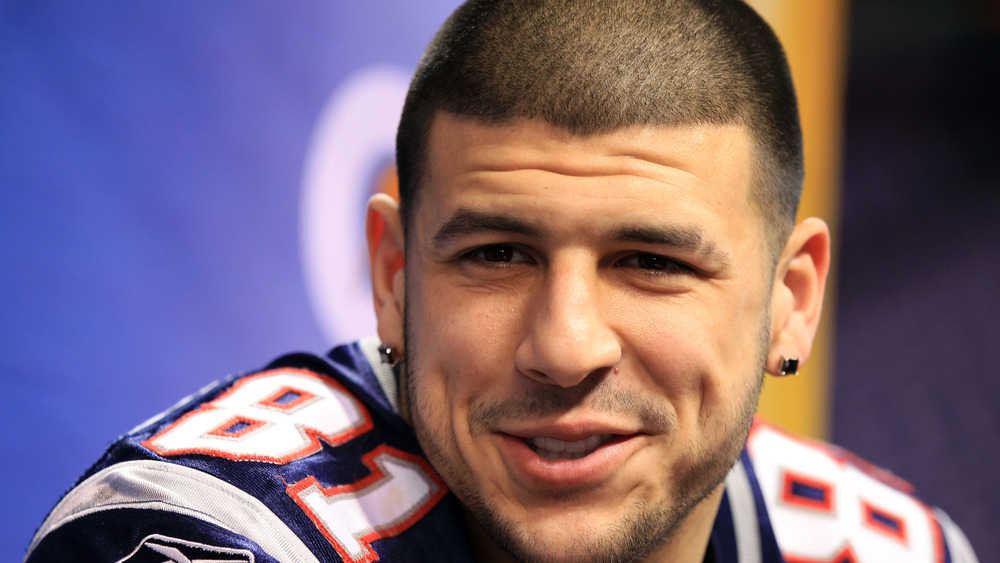Convicted Criminals Who Have Played In The Super Bowl
There is not a single day in television that gathers more butts to couches and eyes to screens than every first Sunday in February. The Super Bowl was first played in 1967, and in the 54 years and games since that first match-up, the game has become less a championship game and more a national event. History says the first game was not a sellout, with over 32,000 empty seats in the Los Angeles Memorial Coliseum. Since then, as reported by a 2019 Hollywood Reporter article, ten of the 13 most viewed television programs have been Super Bowl games.
Commercials, halftime performances, and promos for upcoming shows have made the day a cultural holiday. Oh yeah, there is also the actual game! The best of the AFC versus the best of the NFC. These teams feature some of the greatest players in the world going head-to-head to achieve a childhood dream of hoisting the Lombardi trophy when the clock hits zero.
However, just as Hollywood actors who achieve their dreams do not always have the cleanest records in the world, like Kevin Spacey and Woody Allen to name a few, athletes are no different. Here is a list of football players who have both appeared on the biggest stage in the world, as well as in a courtroom (and seeing that O.J. Simpson never played in the Super Bowl, that is one name that will not be found here).
Ray Lewis
Ray Lewis left his mark on the NFL as one of the greatest players of all time. As a team leader on the field and the face of an organization, Lewis took the newly formed Baltimore Ravens and gave them an identity of a strong, sophisticated defensive team. He is a Hall of Famer and two-time Super Bowl winner. Both accomplishments would seem unbelievable back in 2000 when his name was connected to a double murder.
Following Super Bowl XXXIV, Lewis (whose team did not play in the game) attended a post-game party in Atlanta, as told by Sportscasting. At the party with his entourage, an encounter turned deadly, and two young men, Richard Lollar and Jacinth Baker, were fatally stabbed. Fanbuzz reports that Lewis was in his rented limousine during the fight. However, Lewis' trouble came when he told his friends to keep quiet about the situation.
According to USA Today, Lewis pleaded guilty to obstruction of justice, a misdemeanor, in exchange for testimony against his colleagues, Reginald Oakley and Joseph Sweeting. Still, this came with great controversy, as blood was found in Lewis' limo, the white jacket he had been wearing disappeared, and Lewis himself was originally arrested with the men on murder charges before taking the plea deal. Despite his testimony, the two were acquitted. Lewis was given a year's probation and fined $250,000 by the NFL. The next year, the Ravens won the Super Bowl, and Lewis was named the game's MVP.
Aldon Smith
In the first two seasons of his NFL career, Aldon Smith looked liked one of the best young defensive players in football. According to ESPN, Smith was drafted by the San Francisco 49ers seventh overall, four spots ahead of All-Pro defensive end J.J. Watt and five spots after Super Bowl MVP Von Miller. While Watt and Miller have blossomed into elite pass rushers who are both Hall of Fame bound, off the field issues have plagued Smith's amazing start.
Five days after his rookie season ended, Smith was arrested for suspicion of driving under the influence in Miami. Smith played every game in 2012 and led San Francisco to a Super Bowl appearance. His fellow players named him the seventh-best player in the league. Then the wheels fell off from there.
Since 2013, Smith has been arrested five times, including three times in a two-month span in 2018, ESPN reports. These included weapons charges, DUIs, domestic violence, and making a false bomb threat to Los Angeles International Airport. He has seen jail time, time in rehab, and was cut by both the 49ers and the Oakland Raiders during this period.
Before the 2020 season, the Dallas Cowboys signed the troubled star to a one year deal, as told by Saturday Down South. According to the Dallas Cowboys page, Smith's journey back began when he lost his grandmother, Julia Edwards, to ALS. One of her final messages to her grandson was, "do better."
Barret Robbins
The Super Bowl is the goal for every player when they first arrive for training camp. However, bipolar disorder and substance addiction does not care for the desires of any player. For Barret Robbins, the dreams of Super Bowl glory ended before they even began. According to Sportscasting, two days before the Oakland Raiders and Tampa Bay Buccaneers would duel in the Super Bowl, Robbins disappeared from the hotel the Raiders were staying at.
2002 was a breakout year for both the Oakland Raiders and center Robbins. The team reached the Super Bowl, and Robbins was named a Pro Bowler and All-Pro. However, Robbins never made it to the Super Bowl. Two days before the game, Robbins left for Tijuana, Mexico. He drank excessively, believing he was celebrating a Super Bowl victory, despite the game not being played yet.
According to NBC Sports, Robbins was in no condition to play when he returned to the team hours before the game, and Oakland lost to the Tampa Bay Buccaneers. He was checked into a rehab clinic shortly after and was diagnosed with bipolar disorder. In college at TCU, Robbins was arrested for burglary and was diagnosed with depression but not bipolar disorder. During his second year in Oakland, he was arrested for dining and dashing after being sent home by the team. Unfortunately, Robbins has spent the past two decades either behind bars or in rehab struggling to control his many demons.
Plaxico Burress
Talk about "shooting yourself in the foot," or in this case, the leg. Less than a year after scoring the game-winning touchdown to win the Super Bowl for his New York Giants, wide receiver Plaxico Burress' life and career took a turn after he literally shot himself and was subsequently arrested!
In Super Bowl XLII, Burress caught the go-ahead touchdown pass to give the Giants a 17-14 upset victory over the undefeated New England Patriots (take that Brady)! According to ESPN, the Giants came into the following season better than the year before, winning ten of their first 11 games. The team looked to be the favorites to repeat as champions. In November 2008, Burress, who was at the time not playing because of a hamstring injury, and teammate Antonio Pierce were at a nightclub when Burress' gun went off. According to SNY, Burress did not think he shot himself until he realized he was bleeding down his leg. Pierce then drove him to the hospital and checked in under a false name.
Because of New York's strict gun laws (Burress' weapon was unlicensed, as told by CBS Sports), the profile of Burress' name, and the attempted cover-up, New York mayor Michael Bloomberg made sure to make an example out of the star athlete. Burress pleaded guilty to attempted weapon possession, the The New York Times reports, and was given 20 months in jail. The Giants would lose four of their last six games and fail to repeat as champions.
Barry Switzer
A coach is supposed to be the "leader of men." For Dallas Cowboys coach Barry Switzer, his team sure took a lot from their coach. The Cowboys of the 1990s were one of the greatest and most controversial teams in NFL history, winning games as much as winning front-page headlines. According to the Spokane-Review, by 1997, the team was hoping to clean up their image. Then, their head coach was arrested for having a loaded revolver at an airport.
Switzer, according to the Encyclopedia of Arkansas, joined the Cowboys in 1994 following one of the most successful coaching tenures in NCAA history. During his 16 years as the head coach of the University of Oklahoma, Switzer won three National Championships and went 157-29-4, the fourth-best winning percentage in the sport's history. In his second year as the head coach in Dallas, Switzer won Dallas their third championship of the decade.
Despite his success, Dallas Cowboys owner Jerry Jones was said to be "furious," the The New York Times reported. Carrying a weapon into an airport could have landed the coach two to ten years in prison and a $10,000 fine. Still, the coach found himself back coaching for Dallas soon after. The AP News reported that Switzer pleaded guilty to a misdemeanor, common for individuals with a clean record. He was fined $3,500 and given a one-year deferred adjudication. After a disappointing 1997 season, Switzer resigned from his head coaching position, ending his football career, as told by Sportscasting.
Timmy Smith
One-hit wonders exist in many different ways in society. Sports are included in this, and there has not been a greater one-hit-wonder in pro football than Timmy Smith. Smith went from setting a rushing record in the Super Bowl to being out of the league altogether in a blink of the eye.
Leading into Super Bowl XXII, rookie running back Smith had barely played throughout the regular season. So it only made sense to make him the starting running back for the Super Bowl! Actually, according to NFL Network's "Top 10 One-Shot Wonders," Smith's performance in the NFC Championship game and injures to the starting backs for Washington led to his start, which was kept secret from him to prevent him from being nervous. Smith turned his start into a record-setting day, rushing for a record 204 yards and two touchdowns in a blowout victory.
However, as Sportscasting reports, Smith would start in only nine more games in the NFL. This in large part came because of Smith's reaction after the championship. According to General Manager Bobby Beathard, Smith's agent pushed for his client to become the highest-paid running back in the league, which Washington fought back against. Also, he began to celebrate his victory by taking hard drugs such as cocaine. Smith would play in only 15 more games in his career. According to Sports Illustrated, Smith, by 2005, was selling cocaine. He was sentenced to 30 months in jail for those pursuits, the Denver Post reports.
Mark Ingram
In one of the greatest effort plays in the history of the Super Bowl, wide receiver Mark Ingram avoided five Buffalo defenders in a single play to get a first down and extend the drive of the New York Giants. Ingram and the Giants would win the game 20-19. Unfortunately, like fellow Giants wide receiver Plaxico Burress, Ingram's life went off the rails after his moment of glory on the Super Bowl stage.
In 2008, according to Sportscasting, Ingram was found guilty of bank fraud and money laundering. He was sentenced to 92 months in prison, however, he failed to report to prison when scheduled after his request to watch his son, Alabama running back Mark Ingram, Jr., play in his final collegiate game. Hours before the game, Ingram was arrested in his hotel room. He was given an extra 27 months for failing to surrender.
Five out of the six years Ingram served for that sentence was under supervised release. In 2019, the Super Bowl champion found himself back in hot water when a judge determined he violated his supervised release by possessing a firearm and marijuana and gave him a 21-month prison sentence.
According to AL.com, Ingram was released from prison in April 2020 and ordered to finish the last ten months of his sentence under home confinement. Ingram's lawyer said the outbreak of COVID-19 and his client's asthma, hypertension, and alleged chronic traumatic encephalopathy made him eligible for early release.
Thomas Hollywood Henderson
With a name like "Hollywood," is it really a surprise that the star Cowboys linebacker enjoyed the spotlight a little too much? Thomas Henderson, like so many in Hollywood, is a story of wasted potential. In an interview with the Palm Beach Post, Henderson said that his former Cowboys coach, Tom Landry, believed if the two had stuck together, they could have won multiple Super Bowls. But because of Henderson's drug addiction and "me first" personality, Landry eventually departed with his star just five years into his career. After that, it was all downhill for Henderson.
According to Sportscasting, Henderson became the full-time starter in 1977 in his third season and immediately made an impact, leading the Cowboys to a Super Bowl victory. The stardom also led Henderson to a party lifestyle, where he was introduced to cocaine. By the next year, Henderson was ingesting cocaine liquified after his nose scabbed over from overuse.
Following a subpar 1979 season, Dallas split ways with the troubled linebacker. After two brief stints with the Houston Oilers and Miami Dolphins, Henderson suffered a broken neck, and his career came to an end.
According to the The Washington Post, he pleaded no contest for assaulting two teenage girls he solicited in 1984. He also said he attempted to bribe them to change their testimony. Henderson was sentenced to four years and eight months. Since he has gotten out, Henderson has remained clean and has used his experience to help others.
Darren Sharper
There are few players in any major sport that seemed to be bound for eternity in their sport's Hall of Fame, as a sign of their excellence on the field, but only to squander it away because of off-the-field activities. The best example would be in Major League Baseball with Pete Rose, who was banned for life for betting on the sport and games he coached in. However, at least one could say gambling addiction gripped baseball's hit king into making terrible mistakes. The same can definitely not be said about former NFL safety Darren Sharper.
ESPN reports Sharper played in two Super Bowls and won once. He also made five Pro Bowl teams, six All-Pro teams, and was selected for the 2000s All-Decade team. He retired in 2011. His post-NFL career saw work as an analyst on the NFL network, and his chances at the Hall of Fame remained high. This all changed when women in different states began to tell their stories of being drugged and assaulted by Sharper and his colleagues. According to Bleacher Report, Sharper had been accused of drugging and assaulting as many as 16 women in four different states. In 2014, he pleaded guilty to three different incidents and no contest to a number of different accusations, ESPN reports.
Shaper will not be eligible for release until 2034, and despite his accomplishments on the field, his chances for induction into the Pro Football Hall of Fame are most likely dead.
Eugene Robinson
Imagine on the last day of school, when students are receiving awards for this and that, and the award for perfect attendance goes to a student who so happens to not be there that day. Eugene Robinson is that child. According to Sportscasting, the night before the Super Bowl, the same night he received an award for exemplifying "outstanding character and leadership in the home, on the field, and in the community," All-Pro Atlanta Falcons safety Eugene Robinson was arrested for soliciting an undercover cop. These are the situations that late-night talk show hosts live for.
Not long after the arrest, Robinson returned the award to the Athletes in Action, the organization that originally handed out the honor, according to the Chicago Tribune. After being released, ESPN reports that he spent five hours in his hotel room praying with his Falcon teammates Cornelius Bennett, Ray Buchanan, and William White. Despite the embarrassment, Robinson, with the support of his coach Dan Reeves, played in the Super Bowl. Unfortunately, Robinson's struggles continued, giving up an 80-yard touchdown pass in the game. Falcons lost to the Broncos 34-19. CBS News report that after completing a court-mandated rehab program, the charges were dropped for Robinson.
Speaking to ESPN in 2017 about the incident, Robinson called it the "worst night of my life," and he spent the evening crying. He has since spent his post-NFL life working as a coach at Charlotte Christian School with notable alumni like NBA superstar Stephen Curry.
Aaron Hernandez
Not since O.J. Simpson has an NFL player captured the headlines of the United States like Aaron Hernandez. Less than two years after making his appearance in the Super Bowl, scoring a touchdown in the game, and less than a year after receiving a massive contract extension, making him rich beyond his dreams, Hernandez lost it all after being arrested and eventually convicted of murder. And in this story, there is more than one body lying cold in the morgue.
According to SB Nation, a week after an initial search warrant on his home in North Attleboro, Mass., Hernandez was arrested and charged with first-degree murder on June 26, 2013. The next day, a motive was announced by investigators. They said that the victim, Odin Lloyd, had knowledge of another murder, this one a double homicide from the previous year that Hernandez had a hand in. While playing at the University of Florida in 2007, Hernandez was questioned for a double shooting but was never charged, as stated by the Sporting News.
Less than a year after his initial charge in the murder of Lloyd, Hernandez was charged for the double murders from 2012. Hernandez was found guilty of first-degree murder in the Lloyd case, carrying a sentence of life without parole. On April 14, 2017, Hernandez was acquitted for the double murders. Five days later, the 27-year-old took his own life. Since then, studies of Hernandez's brain showed he suffered a severe case of CTE, The Guardian reports.
